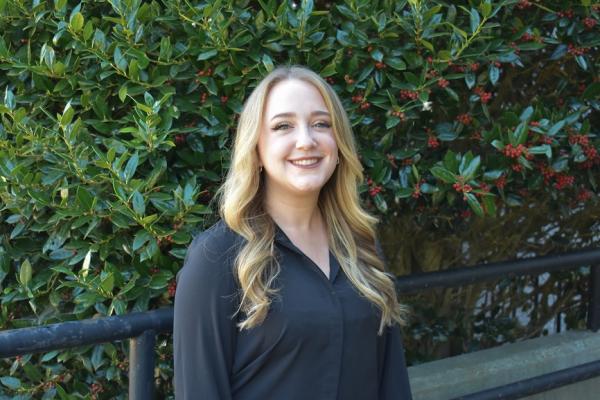
FPG Profile: Lindsay Gomes
Lindsay Gomes, PhD, is a research scientist at the UNC Frank Porter Graham Child Development Institute (FPG). Gomes has extensive experience collaborating with state partners to bridge research, policy, and practice. Her work focuses on understanding the contextual factors that shape young children's social-emotional development within early care and education settings.
As part of our FPG profile series, we recently spoke with Gomes to learn more about her work at FPG. Here’s what she had to say.
Tell us a bit about your professional journey―and what brought you to FPG?
I started working at FPG in August 2021 as a graduate research assistant (GRA) while pursuing my PhD in developmental psychology at UNC. While working on my master’s thesis, I was exploring different career paths and attended a talk by a researcher working in a policy-oriented role. I was fascinated by that mix of research and real-world impact, and after sharing this interest with my advisor, Cathi Propper, PhD, (Propper is a faculty fellow at FPG), she connected me with Sandra Soliday Hong, PhD, at FPG. Learning about Sandy’s work leading the pre-K evaluation team really resonated with me, and I applied to work as a GRA with her team. I stayed on as a GRA through my PhD and, after graduating in May 2025, joined the team full-time as a research scientist.
What do you do at FPG—tell us about the projects you're currently working on.
I work on a few different projects here at FPG. Currently I serve as the project coordinator for the Family Child Care Home Pilot Compensation Grant Follow-Up Evaluation Study, funded by the Preschool Development Grant Birth through Five (PDG B-5), in partnership with the North Carolina Division of Health and Human Services Division of Child Development and Early Education. That means I spend a lot of time managing project logistics, overseeing data collection and recruitment, and digging into qualitative data from surveys and focus groups. I also work on projects evaluating Georgia’s pre-K, in partnership with the Georgia Department of Early Care and Learning. Across all these projects, my days usually involve a mix of partner meetings, data analysis, and writing papers or reports.
What do you like most about your job?
I honestly love my job. My team is incredible; they are warm, collaborative, and endlessly supportive. We’re always learning from each other, whether it’s about conference proposals, grant writing, budgets, or data analysis. Every day feels a little different, which keeps things exciting, especially as an early career scientist. I also really value the strong partnerships we have with our state agencies, which allow us to do meaningful work to support children, families, and educators.
What do you find most challenging?
Funding is often the biggest challenge. It can be discouraging when efforts to secure funding for our research questions don’t pan out. We frequently hear directly from educators, providers, and families about their needs and challenges, and while our research can highlight those issues and point toward solutions, systemic changes take time and often rely on factors beyond our control. I’m hopeful that our work continues to reach the right audiences and drive meaningful change over time.
How does your work further the mission of FPG?
At its core, my work is dedicated to improving the lives of children and families. Everything we do is centered on translating research into practice and policy to ensure that the research evidence meaningfully informs programs and supports in early childhood.
What do you hope to have accomplished five years from now?
It's a little daunting to look ahead, but in five years, I hope to have built a strong publication record with several peer-reviewed manuscripts. I also hope to have secured funding to pursue my own research questions.
Is there anything else you would like people to know about your work at FPG?
I’m incredibly grateful for the early career mentoring group at FPG. As someone just starting out, I’ve found it invaluable to have such a supportive community. The weekly writing meetings, individual and committee mentorship, and sense of camaraderie have been so rewarding. It’s truly a wonderful resource for early career scholars, and I’m so grateful to be a part of it.
